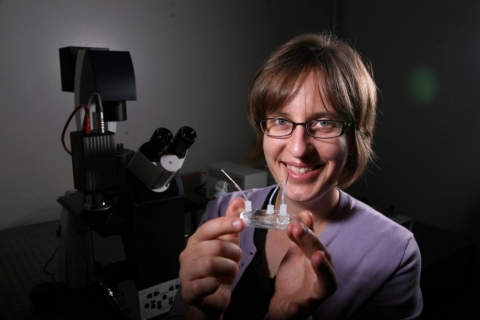
Date:
Location:
Speaker:
Abstract:
Control over adhesion of bacteria underlies a spectrum of practical applications, ranging from preventing the formation of destructive biofilms on medical devices and on resource pipelines to removing pollutants from water. Because microscale bacteria are similar in size to colloidal particles, bacterial adhesion has long been studied using models for colloidal deposition. Many bacteria, however are active and can move, swim, tumble, and rotate near solid-liquid interfaces. This activity, not captured in models for deposition of passive colloids, must affect how bacteria deposit onto surfaces. Here, I will describe recent work in which we explore the relationship between near-surface mobility and adhesion of bacteria to a variety of chemically-modified surfaces in a linear flow microchannel; engineer bacteria to identify surface structures that control transient mobility; and apply insights from the mobility studies to design responsive polymer brush surfaces that detach loosely adherent or mobile bacteria.
Bio:
Jacinta Conrad is the Ernest M. and Barbara J. Henley Associate Professor of Chemical Engineering and Associate Professor of Petroleum Engineering at the University of Houston. She received an S.B. degree in Mathematics from the University of Chicago and M.A. and PhD degrees in Physics from Harvard University. After postdoctoral training in Materials Science and Engineering at the University of Illinois at Urbana-Champaign, she joined the Chemical Engineering department at the University of Houston in 2010. Her research group explores the transport properties of micro- and nanoscale particles [colloids, nanoparticles, bacteria, viruses] in complex media, including fluids containing polymers, proteins, and other dispersed species and/or through highly confined porous media and microchannels. Fundamental insights gained from these studies are applied to applications in antifouling, point-of-care diagnostics, 3-d printing, and enhanced oil recovery.



